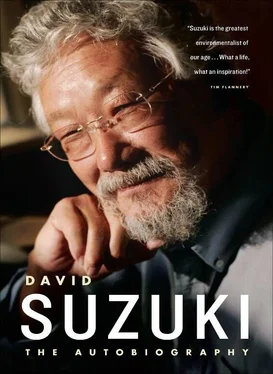My uncles helped my family get on its feet. I don't know what the financial arrangements were, but Dad worked for his younger brothers as a trimmer, doing the fine carpentry of hanging doors, trimming along the floor and windows, and building kitchen cabinets. Years later, his outgoing personality made him perfect to sell insurance on the homes built by Suzuki Brothers Construction. In the first months after our family moved to London, my parents and sisters lived with my Uncle Minoru's family. I missed out on that by remaining with the Shikazes near Leamington, but I heard that it was cramped in that house in London and that the inevitable tensions arose between the families.
By the time I arrived in London, my parents had purchased a lot and the brothers had pitched in and helped to build a small house. When I moved in, the roof had been shingled, but the outside walls were sheathed only with raw plywood, the partitions inside were bare, and the floor was simply subfloor. The house was still being built, but the family had already moved in, covering the partitions with cardboard from boxes. Over the months that followed, as we all worked and contributed our earnings to the family coffer, we gradually bought the materials needed to complete the interior and then the outside. I had begun working as a framer for Suzuki Brothers Construction and loved it, working on weekends, holidays, and during the summers. I learned enough to frame, make sidewalks, build a fruit cellar, and pour a concrete slab at the entrance to our house. It took about two years to complete the dwelling. My sisters and I were embarrassed to be living in an unfinished house and would never invite anyone over.
Dad finally bought a car, the first in the family after the end of the war — a 1929 Model A Ford. It was in good shape, and today anyone would be thrilled to own one, but in the early 1950s, it was humiliating for a teenager. Whenever we drove anywhere, I would slump down, hoping no one I knew would see me. To make matters worse, in the autumn Dad went out to collect the leaves that had piled up on the streets and then been squashed into thick clumps as cars drove over them — perfect mulch for the garden. He made a box that could be hung on the rear bumper of the old car, and after dinner I would have to accompany him as he drove around to find an especially rich area of crushed leaves. We shoveled them into the box, drove home, and dumped the leaves in a pile in the front yard. The next day, after school, it was my task to wheel the leaves to the back of the house, where I would dig trenches in the garden and bury the soggy mess as compost. I lived in fear that I would be recognized as I toiled beside Dad under streetlights, piling leaves into the box at the back of the Model A. I admire Dad's gardening obsession now, but as a teenager, I found it excruciating. Like any boy going through puberty, I had sex on the brain, but I was too shy to talk with others about it. Encountering fellow students on buses or walking along a street, I would do my best to avoid having to make conversation by sitting alone or crossing the street.
At Leamington High School, I had felt comfortable in the student body and had even won the junior oratorical contest. But London Central Collegiate Institute was a different matter. Most students move to high school with friends from elementary school, and in the first year, old friendships are solidified, new ones are formed, and cliques coalesce. By the time I arrived for grade 10 at Central, social circles were pretty well established and I was a total stranger, a hick from a farm, an outsider. As adolescent hormones coursed through my body, I became consumed by thoughts of sex, but I was totally incapable of doing anything about it. It never occurred to me to ask a white girl out on a date, because the fear of refusal was too great. Of the ten Japanese Canadian teenage girls in London, three were my sisters.
In a civics class, we were asked what our parents did. To my surprise, I was the only person in the class whose mother worked; all the other students' mothers were full-time parents, and at that time, that was an indication of social status. To exacerbate my isolation, I was a good student, which in that era was like having leprosy. I was horrified when a teacher once asked each of us to tell what our grades had been the year before. I was ashamed to have to say all my marks had been first-class. “But I did get a second in one exam,” I offered in a vain effort to soften the scorn. As well, for my sisters and me, weekends and summer holidays were not times to play and take vacations; they were opportunities to work and contribute income to the family. I was stunned to discover in another class that my fellow students spent the entire summer on holiday — that is, not working. Again, the situation set me apart from my classmates.
The only Japanese Canadians at London Central Collegiate Institute were my sisters and cousins. My cousins were well integrated, and my sisters had formed friendships in elementary school because they moved to London earlier than I, so for them the transition to high school was easy. Students at Central were pretty homogeneous, and there were even fewer Chinese Canadians than Japanese Canadians. I didn't realize the differences between gentiles and Jews were very important at London Central; to me, they were all whites who happened to go to different churches. When I was in grade 12, one of the candidates for president of the student council was Jerry Grafstein, now a federal Liberal party wheeler-dealer and senator. I voted for him since I admired his talkative disposition and tremendous popularity,

A carp caught in the Thames River in London, Ontario
and I assumed he was a shoo-in. I couldn't believe it when he lost, and I learned only later that Central just didn't elect Jews to student office.
My loneliness during high school was intense. I ached to have a best buddy to pal around with but was far too self-conscious to assert myself and make a friend. My main solace was a large swamp a ten-minute bike ride from our house. Any marsh or wetland is a magical place, filled with mystery and an incredible variety of plant and animal life. I was an animal guy, and insects were my fascination. Anyone who spotted me in that swamp would have had confirmation of my absolute nerdiness as I waded in fully clothed, my eyes at water level, peering beneath the surface, a net and jar in my hands behind my back. But I couldn't spend all my time in that swamp. I spent most of my waking hours daydreaming, creating a fantasy world in which I was endowed with superhuman athletic and intellectual powers that would enable me to bring peace to the world and win mobs of gorgeous women begging to be my girl.
I hung out with a few other marginal guys who were good students but not on any sporting team. In his fascinating 1976 book Is There Life After High School ? Ralph Keyes makes the point that high school is the most intense formative period of our lives. Dividing high school students into two groups — Innies (football players, cheerleaders, basketball players) and Outies (everybody else, wishing they were Innies) — he suggests that our high school status remains with us psychically through adulthood. He's right in my case.
In my last year of high school, one of my fellow nerds suggested I run for school president. It was completely unexpected, and I said no. When I told my father, he was disappointed and asked why. “Because I'd lose” was my explanation. Dad was outraged. “How do you know if you don't even try? Besides, what's wrong with losing? Whatever you do, there will always be people better than you, but that doesn't mean you shouldn't try. There's no shame in not coming in first.” I don't know how he acquired his wisdom, but his response stayed with me for life.
Читать дальше



![David Jagusson - Devot & Anal [Hardcore BDSM]](/books/485905/david-jagusson-devot-anal-hardcore-bdsm-thumb.webp)









